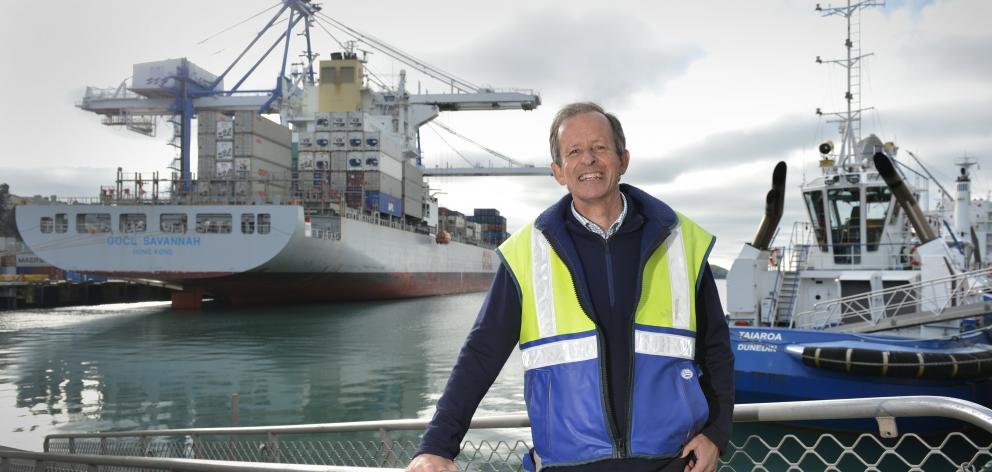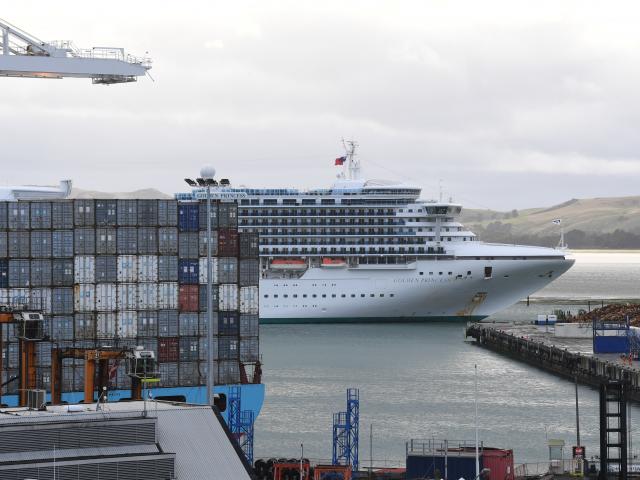
Port Otago’s former chief executive Geoff Plunket. Photo: Gerard O’Brien.
Port Otago’s Geoff Plunket is weighing anchor after 29 years with the company, the last 13 as its chief executive. Mr Plunket reviews his time with ODT senior business and port reporter Simon Hartley.
It’s probably understandable the man who has overseen the intricacies of running Port Otago for the past 13 years wants to keep his retirement plans detail-free and open-ended.
Geoff Plunket (59) has seen a massive sea change during his 29 years with Port Otago, after port reforms in the late 1980s resulted in it morphing from the Otago
Harbour Board into its present-day form under the 100% ownership of the Otago Regional Council.
There has been a decades-long ramping up of container numbers from a relatively paltry 40,000 in 1989 to 220,000 at their peak, the number having since levelled off to about 180,000.

One of the two Chinese-made cranes being delivered in June 2007. Photo: Stephen Jaquiery.
There were minor ship groundings, painful redundancies and restructuring to be worked through at the port as well as industrial action, but there was also a steady turnaround, result ing in a record 320 employees today.
“Fundamentally, it’s always been about the people, both the staff and customers,” he said.
And there were major highlights, such as Port Otago’s corporate “masterstroke” of grabbing a shareholding in arch-rival Lyttelton Port of Christchurch, which would ultimately reap Port Otago tens of millions of dollars.
Mr Plunket was born in Christchurch and his family later moved to Alexandra, where Mr Plunket attended Dunstan High School, before the family moved to Dunedin.
Mr Plunket followed his father into the finance sector, gaining a bachelor of commerce degree from the University of Otago and going on to become a fellow of Chartered Accountants Australia and New Zealand.

Cruise ship Golden Princess nudges into Port Chalmers, to berth opposite container ship Laust Maersk. Photo: Stephen Jaquiery.
He started working in public practice with Coopers & Lybrand in Dunedin in the 1980s, after which he took up a position with the company in Birmingham, England for two years. He then returned to Dunedin, again to work for Coopers & Lybrand, which was followed by a year with KPMG.
He joined Port Otago as financial controller in 1988.
‘‘It was a time of huge change in the industry, with the port reforms just coming into place.’’
The Otago Harbour Board was split up, its 20million shares going to the Otago Regional Council, along with many of its recreational maritime responsibilities, while some land was divested to the Dunedin City Council.
That shareholding has been crucial to the ORC, having yielded more than $148million in dividends and special dividends to date.
However, by the early 1990s container numbers had dwindled to below 40,000 a year and it was determined Port Otago needed restructuring, resulting in jobs
being shed.
Mr Plunket identifies ‘‘two big turning points’’ for Port Otago.
The first was in 1998, when shipping giant Maersk extended its New Zealand port calls to include Port Chalmers. This meant much of what had been shipped as bulk items now went into containers and container numbers began rising.
Maersk is now Port Otago’s largest customer.
‘‘That on its own gave us a lot of customer growth,’’ he said.
The second was in 2002, when Port Otago stole a march on its South Island competitors by securing P&O Nedlloyd’s new round-the-world service, which
began in December of that year.
That left Port Chalmers well placed to capitalise on the then-burgeoning boom in dairy and forestry exports.
‘‘That gave us a substantial lift in container volumes,’’ he said.
In 2004 Mr Plunket took over from Rene Bakx as chief executive, having risen from financial controller to deputy chief executive in 1997.
Large warehousing developments costing millions of dollars were undertaken and had “become an integral part” of the services Port Otago offered.
‘‘It [P&O] was a big win and morale booster for staff.
‘‘It also gave us the confidence to start investing, such as the new [Chinese-made] cranes,’’ which came at a cost of $21million.
Log shipments are a recent success story. Before the 2007-08 global financial crisis only 200,000cum of logs were going across the wharf, and the sector had been struggling for several years. Over the past two years, however, log export levels have been in the 700,000cum to 900,000cum range.
‘‘We now have more log ships coming each month than we would have had for an entire quarter,’’ Mr Plunket said.
He was also proud of the surge in cruise ship visits to Dunedin.
They were ‘‘an important factor’’ for Port Otago, and he was pleased numbers had edged up for the forthcoming season to 87 scheduled visits.
Port Otago subsidiary Chalmers Properties has also become an increasingly important addition to the balance sheet.
He was pleased the company’s Hamilton commercial development and recent Auckland purchases were providing ‘‘strong and positive’’ revenue streams.
‘‘That [Hamilton] develop ment is really going ahead. They’re looking at opening up more land now.’’
Mr Plunket’s tenure has spanned those of the Port Otago board’s four chairmen, Sir Cliff Skeggs (1989-98), Ian Farquhar (1998-01), John Gilks (2001-10) and incumbent Dave Faulkner.
Mr Plunket’s ability to reel off their names and time as chairmen from memory reveals a facility for detail and accuracy.
While praising the four chairmen equally, he singles out Mr Farquhar as having been a ‘‘genuine mentor’’.
It was during Mr Gilk’s tenure as chairman the Port Otago board risked taking a stake of more than 15.5% in rival Lyttelton Port of Christchurch, for $37million, in what was a ‘‘masterstroke’’.
That stake was sold for $65.7million in 2014, wiping much debt from Port Otago’s books.
‘‘The [share] sellers never knew who was buying them,’’ Mr Plunket said of the stealth involved in incrementally building up the 15.5% stake.
At the time Mr Gilks was loath to admit the stake was taken to stop an overseas company from taking over Lyttelton Port of Christchurch, which would have been to the detriment of Port Chalmers trade.
Mr Plunket’s more modest take on it was that it ‘‘gave us a seat at the table’’.
That had included some speculative, but unpopular, merger talks, which were shelved.
When pressed, Mr Plunket said that ‘‘it did stymie the Hutchison takeover … They left, the rest’s history.’’
Unlike some ports, large and small, Port Otago has kept up with maintenance work, rarely deferring such programmes.
During Mr Plunket’s tenure as chief executive, more than $300million has been ploughed into infrastructure upgrades and maintenance, plus its fleet of tugs, cranes and straddle carriers.
The beginning of the end of that expenditure is in sight with the recent start of phase 2 of the $21million ‘‘Next Generation’’ channel dredging programme, to attract larger vessels.
He signalled to the board three years ago his intention ‘‘to retire by 60’’.
‘‘There was succession to organise. Fresh leadership is good — a new set of eyes is always positive.
‘‘You have to be relevant to staff and customers and able to change with the world.’’
Port Otago’s strength lay in its staff, not just wharfside but also warehousing, and Mr Plunket highlighted weekend work, sometimes in atrocious weather conditions.
‘‘That is tough on family life, but someone will always come forward and offer to work.’’
Both the Asian crisis in 1997 and global financial crisis in 2007-08 had taken a toll on exports.
‘‘[However] we’ve got strength in the South with a great export economy in meat, dairy, forestry and apples.’’
Port Otago won the Otago Daily Times Business of the Year in 2014.
He still had ‘‘several weeks of loose ends’’ to tie up, before taking extended leave. He will formally retire in September.
Regarding retirement plans, Mr Plunket, despite being a stickler for detail, was surprisingly noncommittal.
A keen tramper and mountain biker for many years, he had also completed five Kepler Track challenges and Hawea Epic races, in the ‘‘classic’’ 95km mountain bike division.
While his and wife Jo’s three sons had all left home, that was no reason to consider leaving Dunedin and heading to Central Otago, which had been
suggested by many friends, he said.
‘‘No, I see no reason why we’d leave. Dunedin’s home and this is where our friends are.’’
● Mr Plunket formally left the chief executive role last Friday, and his replacement, Dunedin businessman Kevin Winders, started on Monday. The pair spent almost three weeks in Asia and Europe, touring ports and meeting customers.
